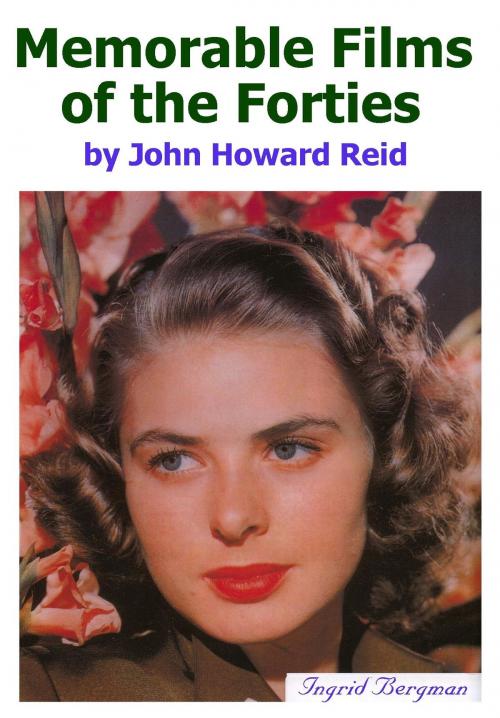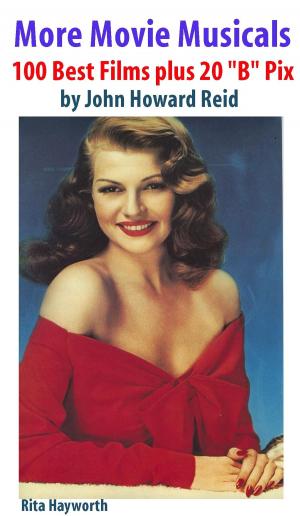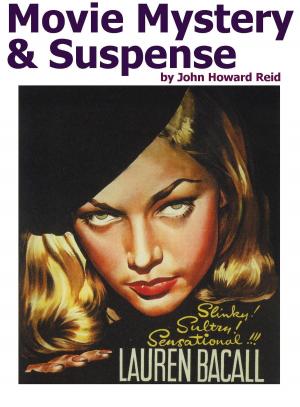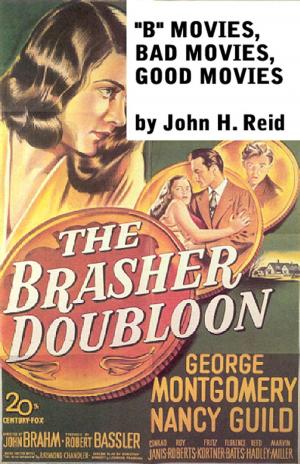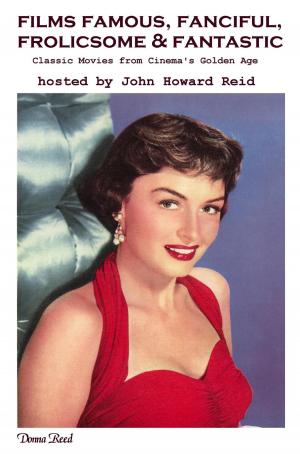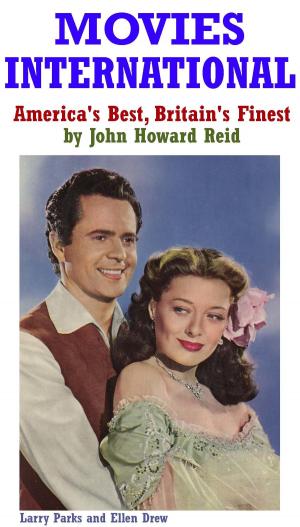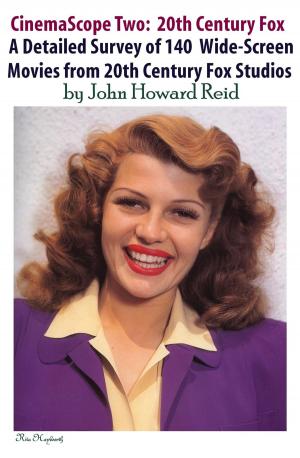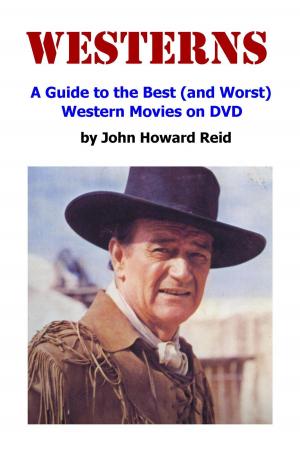Memorable Films of the Forties
Nonfiction, Reference & Language, Reference, Consumer Guides, Social & Cultural Studies, Social Science, Cultural Studies, Popular Culture| Author: | John Howard Reid | ISBN: | 9781458131676 |
| Publisher: | John Howard Reid | Publication: | April 10, 2011 |
| Imprint: | Smashwords Edition | Language: | English |
| Author: | John Howard Reid |
| ISBN: | 9781458131676 |
| Publisher: | John Howard Reid |
| Publication: | April 10, 2011 |
| Imprint: | Smashwords Edition |
| Language: | English |
Ingrid Bergman, the lovely star of "Casablanca", is featured on the cover. It's one of my all-time favorites. Other winning movies featured in this book include "The Black Swan", "All About Eve", "The Paleface", "A Tree Grows in Brooklyn", "The Hasty Heart", "Yankee Doodle Dandy", "Gentleman's Agreement", "The Gunfighter", "Home in Indiana", "The Heiress", "The Three Musketeers", "The Bridge of San Luis Rey", "Captain from Castile", "Centennial Summer", "Come to the Stable", "Comrade X", "The Corsican Brothers", "Easter Parade" and "The Picture of Dorian Gray". Despite a determined challenge from "Laura" and "The Picture of Dorian Gray", "Casablanca" seems to be holding firm to its number one position as a Favorite Film of the Forties. Mind you, it wasn't always so. When I attended uni, the number one cult movie of the decade was "Abbott and Costello Meet Frankenstein". It was closely followed by "Cobra Woman", while "Laura" made an equally tight third. "Cobra Woman" is still currently a top pic in France, but elsewhere it now rates nowhere. How come? What most people don't realize about "Best Film" and "Favorite Film" lists is that the entertainment or artistic quality of a movie figures as a peripheral factor to its current availability, either through constant airings on TV and/or marketing on DVD. "Cobra Woman", for example, is only available at present in France. Hence its current high rating in that country and nowhere status everywhere else. Unfortunately, these false impressions of popularity are fueled by books, magazines and websites that ask people to vote for their favorites. Obviously, people are not going to vote for a movie they've never seen, with the result that these lists always so strongly favor movies that are currently available, they are useless as guides to "movies you must see." This is where a book like "Memorable Films of the Forties" serves a useful purpose. Here you'll find full details, summaries and reviews not only of the movies mentioned above, and similar fare like "Yankee Doodle Dandy", "Meet Me in St Louis", "All About Eve", "Easter Parade", but of pictures like the once super-popular "Forever Amber", "Belle Starr", "Dark Waters", "The Yellow Cab Man" and "The Unsuspected", as well as the critically acclaimed "The Breaking Point", "Caught", "The Lost Moment", "Whispering Ghosts". Scores of other interesting, must-see movies await re-discovery in these pages. Some, of course, are still occasionally aired on TV, while others, like "The Breaking Point" have now actually been re-mastered for a DVD release. Why pay a few dollars for a movie book when you can obtain some (but by no means all) of its information free on the net? "Memorable Films of the Forties" is by no means as comprehensive a survey as the net, but not much about the films it covers is left out. In addition to the information the net provides, such as a synopsis, detailed cast and crew lists, release dates, title changes and running times, this book provides fascinating tidbits and production information that cannot be found elsewhere. For example, one important date the net never provides and this book always does, is the copyright date. Of course, detailed information is not the only thing. This book's strongest points lie in its interesting reviews of the movies themselves. Other sources pale beside the quality of reviews and wealth of information this book provides. Even running times for the USA, England and Australia are listed. These can vary widely from country to country, due to the activities of the censors of the time. Much of this information is fascinating, bordering on the bizarre. Remember the 1948 version of "The Three Musketeers"? The villain of the Dumas novel and other movie versions was the scheming Prime Minister, Cardinal Richelieu. In the 1948 version, however, as a sop to the Legion of Decency, Richelieu has been stripped of his robes and is now plain Monsieur Richelieu!
Ingrid Bergman, the lovely star of "Casablanca", is featured on the cover. It's one of my all-time favorites. Other winning movies featured in this book include "The Black Swan", "All About Eve", "The Paleface", "A Tree Grows in Brooklyn", "The Hasty Heart", "Yankee Doodle Dandy", "Gentleman's Agreement", "The Gunfighter", "Home in Indiana", "The Heiress", "The Three Musketeers", "The Bridge of San Luis Rey", "Captain from Castile", "Centennial Summer", "Come to the Stable", "Comrade X", "The Corsican Brothers", "Easter Parade" and "The Picture of Dorian Gray". Despite a determined challenge from "Laura" and "The Picture of Dorian Gray", "Casablanca" seems to be holding firm to its number one position as a Favorite Film of the Forties. Mind you, it wasn't always so. When I attended uni, the number one cult movie of the decade was "Abbott and Costello Meet Frankenstein". It was closely followed by "Cobra Woman", while "Laura" made an equally tight third. "Cobra Woman" is still currently a top pic in France, but elsewhere it now rates nowhere. How come? What most people don't realize about "Best Film" and "Favorite Film" lists is that the entertainment or artistic quality of a movie figures as a peripheral factor to its current availability, either through constant airings on TV and/or marketing on DVD. "Cobra Woman", for example, is only available at present in France. Hence its current high rating in that country and nowhere status everywhere else. Unfortunately, these false impressions of popularity are fueled by books, magazines and websites that ask people to vote for their favorites. Obviously, people are not going to vote for a movie they've never seen, with the result that these lists always so strongly favor movies that are currently available, they are useless as guides to "movies you must see." This is where a book like "Memorable Films of the Forties" serves a useful purpose. Here you'll find full details, summaries and reviews not only of the movies mentioned above, and similar fare like "Yankee Doodle Dandy", "Meet Me in St Louis", "All About Eve", "Easter Parade", but of pictures like the once super-popular "Forever Amber", "Belle Starr", "Dark Waters", "The Yellow Cab Man" and "The Unsuspected", as well as the critically acclaimed "The Breaking Point", "Caught", "The Lost Moment", "Whispering Ghosts". Scores of other interesting, must-see movies await re-discovery in these pages. Some, of course, are still occasionally aired on TV, while others, like "The Breaking Point" have now actually been re-mastered for a DVD release. Why pay a few dollars for a movie book when you can obtain some (but by no means all) of its information free on the net? "Memorable Films of the Forties" is by no means as comprehensive a survey as the net, but not much about the films it covers is left out. In addition to the information the net provides, such as a synopsis, detailed cast and crew lists, release dates, title changes and running times, this book provides fascinating tidbits and production information that cannot be found elsewhere. For example, one important date the net never provides and this book always does, is the copyright date. Of course, detailed information is not the only thing. This book's strongest points lie in its interesting reviews of the movies themselves. Other sources pale beside the quality of reviews and wealth of information this book provides. Even running times for the USA, England and Australia are listed. These can vary widely from country to country, due to the activities of the censors of the time. Much of this information is fascinating, bordering on the bizarre. Remember the 1948 version of "The Three Musketeers"? The villain of the Dumas novel and other movie versions was the scheming Prime Minister, Cardinal Richelieu. In the 1948 version, however, as a sop to the Legion of Decency, Richelieu has been stripped of his robes and is now plain Monsieur Richelieu!
